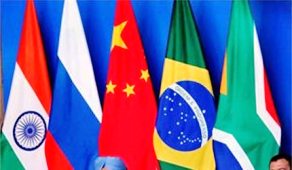 The Summit of BRICS nations in Durban on Wednesday may take a call on the setting up of a development bank notwithstanding some key issues dogging it even as the leaders will advocate reforms of the global governance architecture.
The Summit of BRICS nations in Durban on Wednesday may take a call on the setting up of a development bank notwithstanding some key issues dogging it even as the leaders will advocate reforms of the global governance architecture.
The Summit, which will open late on Tuesday night with a cultural programme and attended among others by Prime Minister Manmohan Singh, is expected to take a decision on launching the BRICS bank that will fund infrastructure and development projects in the BRICS and other emerging economies and developing nations.
Finance Ministers of Brazil, Russia, India, China and South Africa, including P Chidambaram, are likely to prepare a report for consideration of their leaders on Wednesday in which they are expected to say that launching a BRICS bank is ‘feasible and workable’.
However, Indian negotiators are also conscious of the fact that issues like capital, membership and governance are yet to be thrashed out before the summit can put a seal of approval on launching the BRICS bank.
Discussions are on over capital for the development bank, initially envisaged to be set up with a capital of $50 billion, to be shared equally by the five members.
Now Indians are a little cautious over the enthusiasm of Chinese to pick up higher stakes in the capital if some members find it difficult to come up with their share.
The other issues are whether the membership should be confined to just the group's members or should it be open to other developed economies as members.
Also whether the bank should fund projects on differential rates of interest or whether it should be at the market rates to sustain itself as a viable unit in the long run.
Also whether the bank should be on the lines of the Bretton Woods institutions like the World Bank and IMF but with no dominance to one country in the quota and voting rights, Indian
The finance ministers would present the report for the heads of government tomorrow (Prime Minister Singh, President Jacob Zuma of South Africa, Xi Jinping of China, Vladimir Putin of Russia and Dilma Rouseff of Brazil) who are expected to approve the roadmap for the creation of the bank.
The final document on setting up the bank could be ready by next year and from then on it could take a few years to start operations.
The setting up of the bank has been generally welcomed as a very important step which can address gaps and challenges in critical sectors.
The public and private sectors in these countries could be expected to seize the opportunities and evolve collaborations at the leel of group, bilateral as well as third country collaborations.
The other major issue at the summit is the need for reforms of global governance architecture, including the international financial institutions.
There is a feeling in the BRICS and developing countries that the global institutions are yet to reflect the changing global picture where the emerging economies are playing a larger role.
Another agenda for the BRICS economies is to work with the international community in keeping the multilateral trading system stable, curb trade protectionism and push for a comprehensive and balanced outcome of the Doha round.
Officials said the focus of the Summit would be on Africa since it was being held for the first time in African soil.
The theme of the Durban Summit is "BRICS and Africa: Partnership for Development, Integration and Industrialisation.
Together the BRICS account for 25 per cent of global GDP and 40 per cent of the world's population.
With a combined GDP totaling around $14 trillion, the BRICS have accounted for 30 per cent of global economic growth since Goldman Sachs coined the BRIC acronym in 2001.
Last year, intra-BRICS trade soared to $282 billion, up from only $27 billion 10 years ago.











 © 2025
© 2025